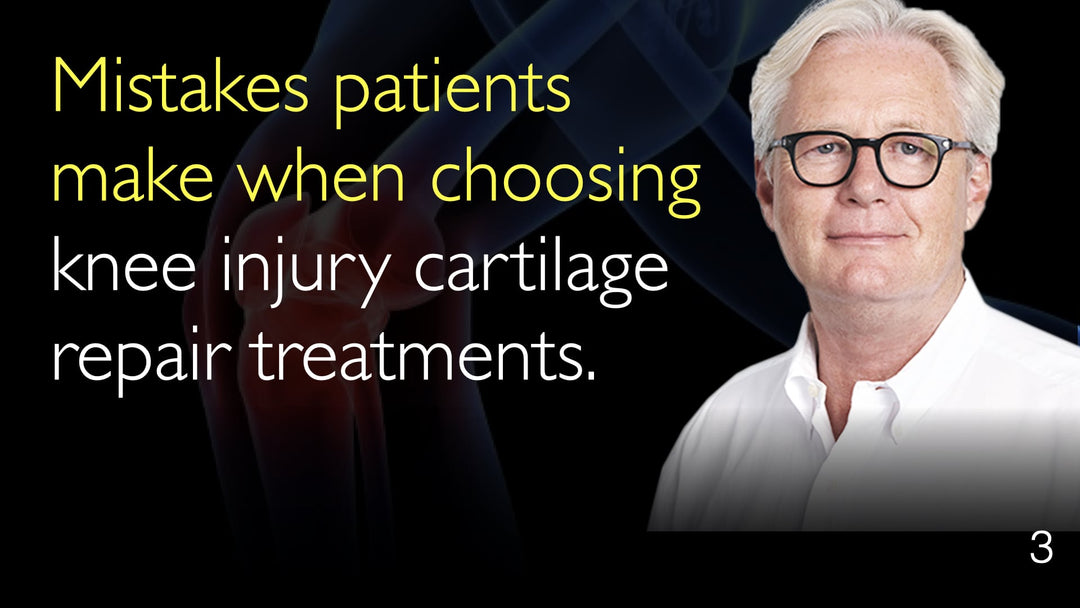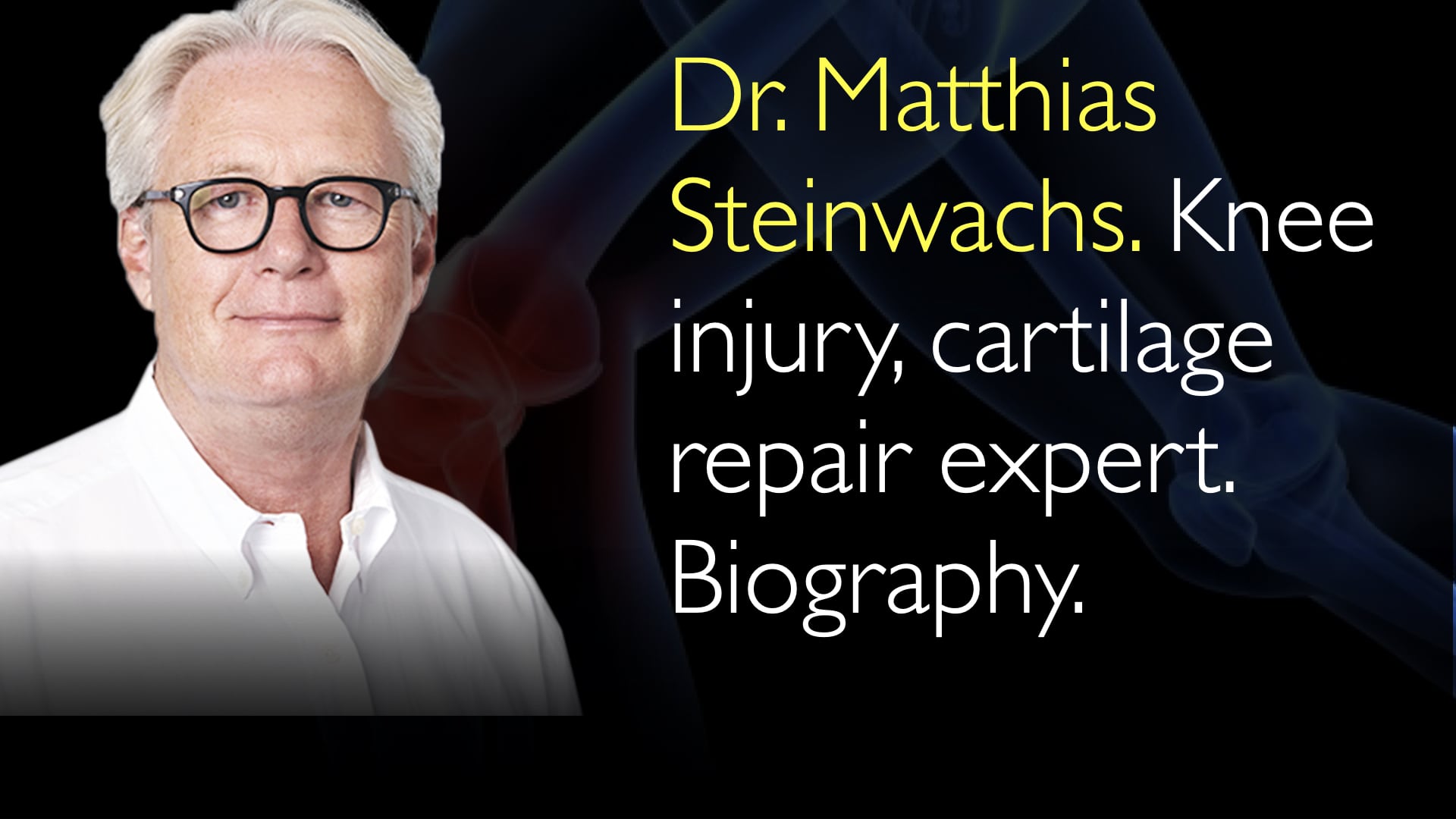膝軟骨修復の権威であるMatthias Steinwachs医学博士が、膝関節損傷の治療において患者が陥りがちな誤解について解説します。博士は、回復には現実的な期間が必要であることを強調。また、初期段階での手術アプローチが不十分であるという重大な問題点を指摘します。博士が提唱するのは、膝の損傷を包括的かつ同時に治療するアプローチです。この戦略により、繰り返しの再手術を回避し、長期的な治療成果の向上が期待できます。
膝関節損傷の最適な修復戦略と治療ミスの回避
セクションへ移動
- 膝関節損傷治療における患者側の一般的なミス
- 膝関節手術における半月板温存の重要性
- 包括的治療概念の必要性
- 複雑な膝関節損傷に対する外科医の専門性要件
- 複数回の膝関節再手術の帰結
- 膝関節損傷に対する最適な初期治療アプローチ
- 全文書き起こし
膝関節損傷治療における患者側の一般的なミス
Matthias Steinwachs医学博士は、膝関節の靭帯や軟骨損傷の治療を求める患者が陥りがちな主な過ちとして、回復期間に対する非現実的な期待と治療への遵守率の低さを挙げています。Steinwachs博士は、患者全員が損傷部位の回復に必要な現実的な期間について十分な説明を受けるべきだと強調します。この理解不足は、しばしばフラストレーションやリハビリテーション計画の遵守率低下につながります。
膝関節手術における半月板温存の重要性
Matthias Steinwachs医学博士は、自身が頻繁に目撃する重大な外科的過誤として、不必要な半月板切除を指摘しています。多くの患者が修復ではなく切除を伴う靭帯再建術を受けている現状を問題視します。半月板は膝関節の安定性維持と軟骨保護に不可欠な構造であり、Steinwachs博士は将来の関節変性を防ぐため、可能な限り半月板縫合を推奨しています。
包括的治療概念の必要性
主要な治療ミスの一つは、膝関節損傷を部分的にしか対処しない点にあります。Matthias Steinwachs医学博士は、膝関節損傷には靭帯、半月板、軟骨など複数の構造が関与することが多いと指摘します。同博士のクリニックには、すべての損傷部位が同時に対処されなかった患者が多く訪れます。この断片的なアプローチは膝関節の解剖学的・生物力学的相互関係を無視し、最終的に治療成績を悪化させます。
複雑な膝関節損傷に対する外科医の専門性要件
膝関節損傷の成功的な修復には、幅広い技術的知識を持つ外科医が不可欠です。Matthias Steinwachs医学博士は、複雑な膝関節損傷の治療にはあらゆる半月板縫合技術と多様な靭帯再建法に精通している必要があると説明します。この専門性によって初めて、患者一人ひとりに真に個別化された治療計画を立てることが可能になります。Anton Titov医学博士は、Steinwachs博士とともに、この高水準の外科技術が膝関節損傷の全側面を適切に対処する基盤であることを議論しています。
複数回の膝関節再手術の帰結
Matthias Steinwachs医学博士は、複数回の失敗した手術後に自身のクリニックを訪れる患者の多さに言及しています。再手術を重ねるごとに治療成績が著しく悪化することを指摘し、膝関節は3回または4回の外科的介入後に慢性損傷状態に移行すると説明します。この傾向は、繰り返し処置を行う悪循環を避けるため、初期治療を正しく行うことの重要性を浮き彫りにしています。
膝関節損傷に対する最適な初期治療アプローチ
膝関節損傷治療の最良の方法は、最初の治療段階を完璧に実行することにあります。Matthias Steinwachs医学博士は、初期の関節鏡検査および外科的処置で膝関節損傷のすべての病的側面を包括的に扱わなければならないと断言します。Anton Titov医学博士と議論されたこの戦略は、患者が複数回の再治療を必要としないことを保証するものです。適切に行われた初期治療は、膝関節の完全な機能回復と長期的な関節健康を実現する最高の可能性を提供します。
全文書き起こし
Anton Titov医学博士: 膝関節損傷は、特にスポーツ選手に多く見られます。前十字靭帯損傷、半月板断裂、膝蓋骨外傷、骨軟骨骨折、さまざまな膝関節軟骨損傷を頻繁に診ます。膝関節の靭帯や軟骨損傷、骨軟骨骨折の治療を求める際、患者はどのようなミスを犯しがちですか?過去に膝関節損傷の治療を受けた患者において、繰り返し見られる過ちは何でしょうか?
Matthias Steinwachs医学博士: いくつかの典型的なミスがあります。第一に、患者の期待と治療遵守に関する全般的な問題です。すべての患者は、損傷部位の回復に必要な現実的な期間について説明を受ける必要があると考えます。
第二に、セカンドオピニオンとして多くの症例を診ています。私の診察前に治療を受けた患者の多くは、損傷部位全体に対する包括的なアプローチが不足していました。例えば、靭帯断裂と部分的な半月板損傷を併発している場合、多くの患者が靭帯再建術から治療を開始します。それが適切であったかどうかは別として、多くの症例で半月板切除が行われています。
半月板は重要な問題です。可能な限り縫合する必要があります。なぜなら半月板は安定性と軟骨保護において不可欠な要素だからです。見過ごされがちなのは、膝関節のすべての損傷を正確に対処する包括的なアプローチです。これには、あらゆる技術に精通した優秀な外科医が必要です。
外科医はあらゆるタイプの半月板縫合術と靭帯再建法を熟知していなければなりません。つまり、個別の治療計画が必要であり、患者はすべての側面を可能な限り正確に処理するために、その個別計画に基づいて治療を受ける必要があります。これが良好な治療成績を得る主要なポイントです。
Anton Titov医学博士: 一度、二度、三度と治療を受けた後、あなたのクリニックを訪れる患者はどのくらい一般的ですか?複数回の膝関節再損傷はどのくらい頻繁に見られますか?これらの膝関節損傷に概念的に対処する最良の方法は何でしょうか?
Matthias Steinwachs医学博士: 最良のアプローチは、最初の段階を正しく行うことです。最初の関節鏡検査と治療は最善の方法で実施される必要があります。初期治療では、膝関節の損傷のすべての悪い側面に対処しなければなりません。
再手術を重ねるごとに治療成績が悪化することが分かっています。膝関節は3回または4回の介入後に慢性損傷状態に移行するからです。最善の方法は、最初の治療段階を正しく行い、患者が2回目や3回目の再治療を必要としないようにすることです。





